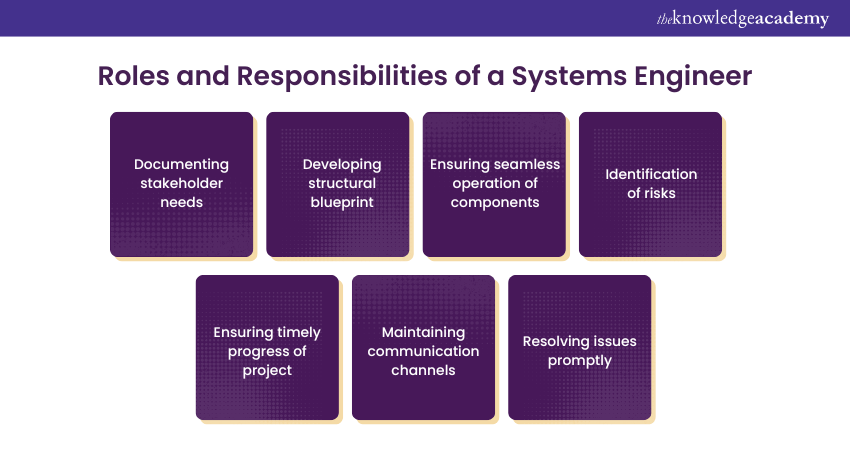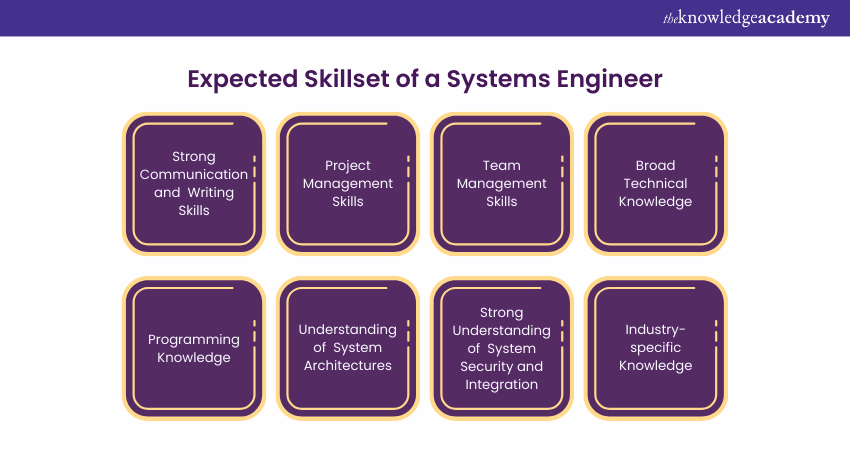We may not have the course you’re looking for. If you enquire or give us a call on +44 1344 203999 and speak to our training experts, we may still be able to help with your training requirements.
Training Outcomes Within Your Budget!
We ensure quality, budget-alignment, and timely delivery by our expert instructors.

As businesses grow more complex, they need professionals who can integrate everything seamlessly, innovate, and troubleshoot effectively. This is where Systems Engineers come into play. But What is a Systems Engineer?
Whether you're new to the field or an experienced pro looking to expand your knowledge, understanding the role of a Systems Engineer is key to your growth. So, why wait? Dive into this blog to discover how Systems Engineers design and manage intricate systems, ensuring all parts function harmoniously.
Table of Contents
1) Understanding What is a Systems Engineer
2) Exploring the Roles and Responsibilities of a Systems Engineer
3) Steps to Become a Systems Engineer
4) Expected Skillset of a Systems Engineer
5) Salary of a Systems Engineer
6) Does Systems Engineering do Coding?
7) What Tools and Software do Systems Engineer Use?
8) Conclusion
Understanding What is a Systems Engineer
A Systems Engineer is a professional who specialises in designing, managing, and optimising complex Systems to ensure their efficiency, reliability, and overall success. These Systems can encompass a wide range of fields, including Aerospace, Automotive, Software Development, healthcare, and more.
Furthermore, the primary objective of a Systems Engineer is to consider the entire system as a whole rather than its individual components by applying a holistic and systematic approach. They gather and analyse requirements, create system architectures, integrate components, and rigorously test to ensure that the system meets its intended goals.
Moreover, Systems Engineers play a pivotal role in Risk Assessment and Management, identifying potential issues and developing strategies to mitigate them throughout the system's lifecycle.
Effective communication, problem-solving, Project Management, and a strong technical background are essential skills for a Systems Engineer. They are instrumental in shaping the success of complex projects across diverse industries.
Exploring the Roles and Responsibilities of a Systems Engineer
After understanding about What is a Systems Engineer, it’s time to learn about their key roles and responsibilities. A Systems Engineer is a professional responsible for multiple tasks. Their key responsibilities include the following:

a) Requirement Elicitation: Gathering, understanding, and documenting the needs and constraints of the system from stakeholders. This involves defining both functional and non-functional requirements.
b) System Architecture: Developing a high-level design that defines the structure, components, and their interrelationships within the system.
c) Integration and Testing: Ensuring that all system components work seamlessly together through rigorous testing. Systems Engineers need to verify that the system meets the defined requirements.
d) Risk Assessment and Management: Identifying potential risks that might arise during the development process and formulating strategies to mitigate or manage them effectively.
e) Project Management: Overseeing the project's timeline, budget, and allocation of resources. Systems Engineers ensure that the project stays on track and meets its objectives.
f) Stakeholder Communication: Maintaining clear and effective communication with team members, clients, and other stakeholders to keep them informed about the project's progress and to address any concerns or changes.
g) Problem-Solving: As complex projects can involve unexpected issues, Systems Engineers must employ their problem-solving skills to identify and resolve issues promptly.
Ready to build a future in Software Engineering? Join our Software Engineering Training and kickstart your career in technology today!
Steps to Become a Systems Engineer
Becoming a Systems Engineer is a rewarding career path that demands a combination of education, certifications, and skills. Below is a list breaking down the key steps to becoming a Systems Engineer. Let's have a quick look at it:
1) Educational Background
To embark on a career as a Systems Engineer, a solid educational foundation is essential. This typically begins with a bachelor's degree in a relevant field. The common degree programs include the following:
a) Bachelor's in Systems Engineering: Some universities offer dedicated Systems Engineering programs. They provide a comprehensive education tailored to the profession.
b) Bachelor's in Electrical Engineering: Many Systems Engineers start with these related disciplines like Mechanical Engineering or Computer Science, which provide a strong technical foundation. They can then specialise in systems engineering through advanced coursework or graduate programs.
c) Master's in Systems Engineering: While not always required, a Master's Degree in Systems Engineering can enhance your knowledge and job prospects. It's an opportunity to dive deeper into the field and often involves hands-on projects.
2) Systems Engineering Certifications
Earning relevant certifications can demonstrate your expertise and commitment to potential employers. Some certifications valuable for Systems Engineers include the following:
a) Project Management Professional (PMP): While not specific to Systems Engineering, the Project Management Professional (PMP) Certification is highly regarded for professionals who manage complex projects, a significant part of a Systems Engineer's role. The Certification trains candidates to learn the evolution and principles of Project Management and acquire knowledge pertaining to Agile methodologies and their implementation in the process of Software Development.
b) Certified Information Systems Security Professional (CISSP): For those interested in specialising in System Security, CISSP is a widely recognised Certification in the field. The Certification is designed to train candidates with the expertise they need to safeguard critical data, eliminate risks and ensure the implementation of security measures in the organisation.
Design robust software architectures with our Software Design and Architecture Training. Start building smarter solutions today!
Expected Skillset of a Systems Engineer
A Systems Engineer is a versatile professional who needs a diverse skill set to excel in this multidisciplinary role. Below is a list highlighting the various skills expected of a Systems Engineer, including but not limited to the following:

a) Strong Communication and Writing Skills: Effective communication is paramount for a Systems Engineer. They need to convey complex technical information to both technical and non-technical stakeholders. Additionally, they must have strong writing skills to document system requirements, architectures, and project plans clearly and comprehensively.
b) Project Management Skills: Systems Engineers oversee complex projects from start to finish, making project management skills essential. They manage resources, budgets, and timelines and meet project milestones. An understanding of Project Management methodologies like Agile or Waterfall is also beneficial.
c) Team management Skills: As leaders in System Design and Development, Systems Engineers often lead cross-functional teams. Effective team management skills, including leadership, motivation, and conflict resolution, are vital to keep the project on track and ensure team members work harmoniously.
d) Broad Technical Knowledge: A Systems Engineer should possess a solid foundation in technology and engineering concepts. This knowledge spans across various disciplines, such as software, hardware, and network systems. These skills allow them to understand the interactions and dependencies within complex systems.
e) Programming Knowledge: A Systems Engineer should have programming skills, as they may need to create or modify scripts and code to automate tasks, integrate components, or troubleshoot issues. Proficiency in programming languages like Python, Java, or C++ can be beneficial.
f) Understanding of System Architectures: Systems Engineers need a deep understanding of System Architectures, including design principles, patterns, and frameworks. This knowledge enables them to create effective system blueprints and ensure that components integrate seamlessly.
g) Strong Understanding of System Security and Integration: Security is a critical aspect of Systems Engineering. Systems Engineers must understand security best practices and be able to integrate security measures into system designs to protect against vulnerabilities and threats.
h) Industry-specific Knowledge: Depending on the industry they work in, Systems Engineers need domain-specific knowledge. For example, in Aerospace, they must be familiar with aviation regulations, while in healthcare, they should understand healthcare compliance standards.
i) Decision-making Skills: Systems Engineers are often faced with complex decisions, whether related to technology choices, risk management, or project prioritisation. Strong decision-making skills are crucial to navigate these challenges effectively.
j) Coding and Scripting Skills: The ability to write and modify code and scripts is essential for automating tasks, troubleshooting, and making components work together seamlessly. Scripting languages like Bash or PowerShell are often valuable tools for Systems Engineers.
k) Problem-solving Skills: Systems Engineers are problem solvers by nature. They must quickly identify issues and develop innovative solutions to address them. Strong analytical and critical thinking skills are essential.
l) Team Coordination Skills: In System Design and development, collaboration is key. Systems Engineers need to coordinate efforts among various team members, from developers to project managers, to ensure everyone is aligned with the project's goals.
Salary of a Systems Engineer
In the UK, the salaries of Systems Engineers can vary significantly based on their level of experience. Here's an overview of the approximate annual salaries for Systems Engineers at entry, average, and senior levels:

Systems engineers who are just starting their careers typically earn annual salaries ranging from £25,000 to £45,000. At this stage, they often have limited work experience but may hold relevant degrees or certifications.
After a few years of experience and a strong understanding of the field, professionals can expect average annual salaries between £50,000 and £70,000. They often handle more complex responsibilities and projects.
Senior Systems Engineers with extensive experience and a proven track record in managing complex systems and projects can earn substantial salaries ranging from £70,000 to £95,000 or more. These professionals often play leadership roles and have significant responsibilities in designing, implementing, and maintaining critical systems.
Does Systems Engineering do Coding?
Yes, Systems Engineering often involves coding, especially for automation, system integration, and scripting. Engineers may use programming languages like Python, Java, or C++ to design, troubleshoot, or optimise systems, though the extent varies by project and role.
What Tools and Software do Systems Engineers Use?
Systems Engineers use tools like MATLAB, AutoCAD, Jenkins, Docker, and Ansible for design, testing, automation, and deployment. They also rely on monitoring tools like Nagios or Splunk and version control systems like Git to streamline and manage their workflows.
Unlock advanced tools in systems with our Systems Modelling Techniques Course. Start enhancing your designs today!
Conclusion
We hope you have acquainted yourself with the concept of What is a Systems Engineer, and how it reveals a multidisciplinary role critical for managing complex systems. With diverse skills, project oversight, and a holistic approach, Systems Engineers play an indispensable part in optimising efficiency and achieving objectives across numerous industries.
Familiarise yourself with the power, design and landscape of systems by signing up for our Systems Engineering Training now!
Frequently Asked Questions

A Systems Engineer designs, develops, and implements complex systems, focusing on architecture and integration. While a Systems Administrator manages, maintains, and supports existing systems, ensuring smooth daily operations and addressing technical issues.

A Systems Engineer ensures reliability by designing scalable architectures, implementing redundancy, and conducting rigorous testing. They optimise performance through monitoring tools, regular updates, load balancing, and by addressing bottlenecks proactively.

The Knowledge Academy takes global learning to new heights, offering over 30,000 online courses across 490+ locations in 220 countries. This expansive reach ensures accessibility and convenience for learners worldwide.
Alongside our diverse Online Course Catalogue, encompassing 19 major categories, we go the extra mile by providing a plethora of free educational Online Resources like News updates, Blogs, videos, webinars, and interview questions. Tailoring learning experiences further, professionals can maximise value with customisable Course Bundles of TKA.

The Knowledge Academy’s Knowledge Pass, a prepaid voucher, adds another layer of flexibility, allowing course bookings over a 12-month period. Join us on a journey where education knows no bounds.

The Knowledge Academy offers various Software Engineering Courses, including Software Design and Architecture Training, Systems Development Essentials Training, Software Development Lifecycle Training. These courses cater to different skill levels, providing comprehensive insights into Web Development.
Our Programming & DevOps Blogs cover a range of topics related to Software Design and Architecture, offering valuable resources, best practices, and industry insights. Whether you are a beginner or looking to advance your skills in Software Design and Architecture, The Knowledge Academy's diverse courses and informative blogs have you covered.
Upcoming Programming & DevOps Resources Batches & Dates
Date
 Systems Engineering Training
Systems Engineering Training
Fri 28th Mar 2025
Fri 23rd May 2025
Fri 4th Jul 2025
Fri 5th Sep 2025
Fri 24th Oct 2025







 Top Rated Course
Top Rated Course



 If you wish to make any changes to your course, please
If you wish to make any changes to your course, please


